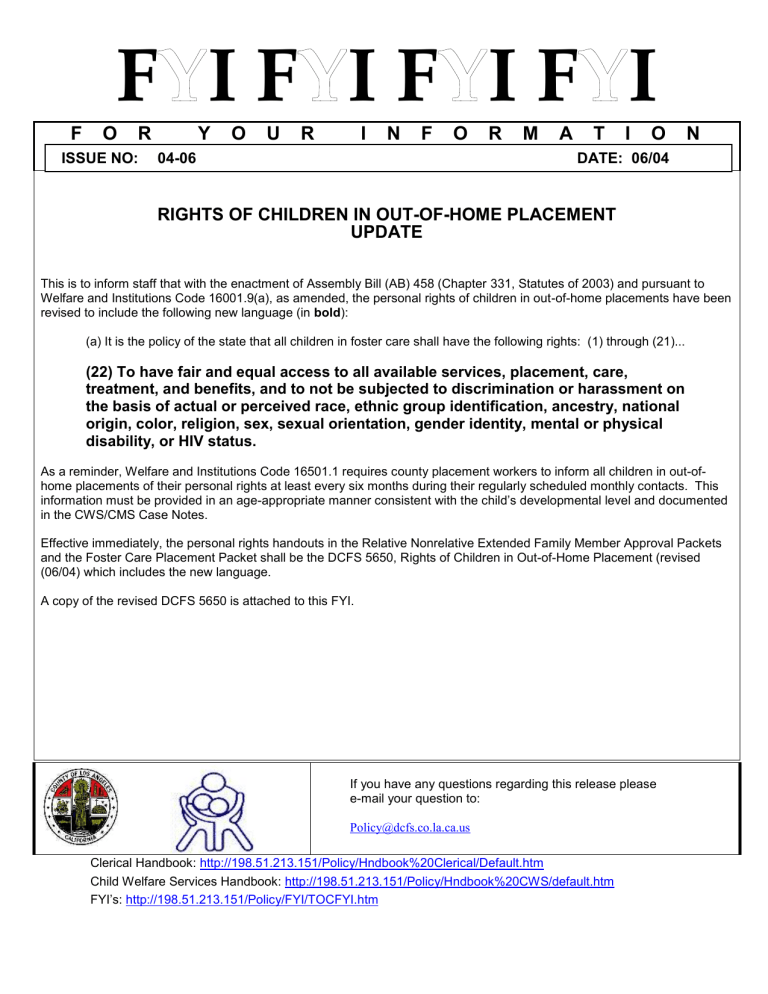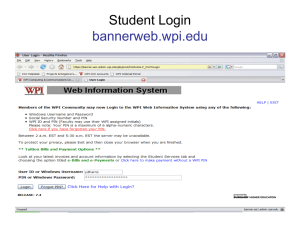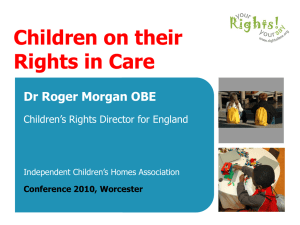06/04 - Rights of Children In Out-of-Placement Update

F I F I F I F I
F O R Y O U R I N F O R M A T I O N
Issue 04-06 Date:
RIGHTS OF CHILDREN IN OUT-OF-HOME PLACEMENT
UPDATE
This is to inform staff that with the enactment of Assembly Bill (AB) 458 (Chapter 331, Statutes of 2003) and pursuant to
Welfare and Institutions Code 16001.9(a), as amended, the personal rights of children in out-of-home placements have been revised to include the following new language (in bold ):
(a) It is the policy of the state that all children in foster care shall have the following rights: (1) through (21)...
(22) To have fair and equal access to all available services, placement, care, treatment, and benefits, and to not be subjected to discrimination or harassment on the basis of actual or perceived race, ethnic group identification, ancestry, national origin, color, religion, sex, sexual orientation, gender identity, mental or physical disability, or HIV status.
As a reminder, Welfare and Institutions Code 16501.1 requires county placement workers to inform all children in out-ofhome placements of their personal rights at least every six months during their regularly scheduled monthly contacts. This information must be provided in an age-appropriate manner consistent with t he child’s developmental level and documented in the CWS/CMS Case Notes.
Effective immediately, the personal rights handouts in the Relative Nonrelative Extended Family Member Approval Packets and the Foster Care Placement Packet shall be the DCFS 5650, Rights of Children in Out-of-Home Placement (revised
(06/04) which includes the new language.
A copy of the revised DCFS 5650 is attached to this FYI.
If you have any questions regarding this release please e-mail your question to:
Policy@dcfs.co.la.ca.us
Clerical Handbook: http://198.51.213.151/Policy/Hndbook%20Clerical/Default.htm
Child Welfare Services Handbook: http://198.51.213.151/Policy/Hndbook%20CWS/default.htm
FYI’s: http://198.51.213.151/Policy/FYI/TOCFYI.htm
PERSONAL RIGHTS
TITLE 22, DIVISION 6, CHAPTER 9.5, ARTICLE 3
Welfare and Institutions Code 16001.9 (02/04)
§ 89372 § 89372
(a) The caregiver shall ensure that each child is accorded the personal rights specified in this section.
(b) Each child, and his/her authorized representative, shall be personally advised, and given at admission a copy of the rights specified in (c) below.
(c) Each child shall have personal rights which include but are not limited to the following:
(1) To be accorded safe, healthful and comfortable home accommodations, furnishings and equipment that are appropriate to his/her needs.
(A) To have storage space for his/her private use.
(2) To be treated with respect and to be free from physical, sexual, emotional or other abuse.
(3) To be treated with respect and to be free from discrimination, intimidation or harassment based on sex, race, color, religion, ancestry, national origin, disability, medical condition or sexual orientation or perception of having one or more of these characteristics.
(4) To be free from corporal or unusual punishment, infliction of pain, humiliation, intimidation, ridicule, coercion, threat, mental abuse, or other actions of a punitive nature including but not limited to interference with the daily living functions of eating, sleeping, or toileting, or withholding of shelter, clothing, or aids to physical functioning.
(5) To receive adequate and healthy food.
(6) To be provided adequate clothing and personal items.
(A) To wear his/her own clothes.
(B) To possess and use his/her own personal items including toiletries.
(7) To receive an allowance if living in a group home.
(8) To receive necessary medical, dental, vision, and mental health services.
(9) To be free of the administration of medication or chemical substances, unless authorized by a physician and, if required, by court order.
(10) To have social contacts with people outside of the foster care system, such as teachers, church members, mentors and friends.
§ 89372
(11) To contact family members, unless prohibited by court order.
(12) To visit and contact brothers and sisters, unless prohibited by court order.
(13) To contact social workers, attorneys, foster youth advocates and supporters, Court Appointed
Special Advocates (CASA), and probation officers.
(14) To have visitors, provided the rights of others are not infringed upon.
(A) Relatives, during waking hours, unless prohibited by court order, or by the child's authorized representative.
(B) Authorized representative.
(C) Other visitors, unless prohibited by court order or by the child's authorized representative.
(15) To contact Community Care Licensing Division of the State Department of Social Services if residing in a licensed home, or the State Foster Care Ombudsperson regarding violations of rights, to speak to representatives of these offices confidentially and to be free from threats or punishments for making complaints.
(A) To be informed and to have his/her authorized representative informed, by the caregiver of the provisions of law regarding complaints, including but not limited to the address and telephone number of the complaint, receiving unit of the licensing agency and of information regarding the confidential registration of complaints.
(16) To make and receive confidential telephone calls and send and receive unopened mail, unless prohibited by court order.
(A) Reasonable restrictions may be imposed by the social worker/caregiver to calls and correspondence.
(B) No restrictions shall be applied to those listed in (c)(12) above.
(C) Other reasonable restrictions may be imposed. The caregiver may:
1.
Request long distance cost reimbursement, for calls made by the child, from the child or his/her authorized representative;
2.
Be permitted to deny the making of long distance calls by the child upon verification that previous long distance calls have not been paid.
3.
Ensure that telephone use does not infringe upon the rights of others, nor tie up the phone during emergencies;
(D) To have access to letter writing material.
(17) To be free to attend religious services and activities of his/her choice and to have visits from the spiritual advisor of his/her choice.
(18) To be accorded the independence appropriate to the child's age, maturity, and capability consistent with the child's Needs and Services Plan or Transitional Independent Living Plan
(TILP) if applicable.
(A) To attend Independent Living Program classes and activities if he/she is 16 or older.
(B) To maintain an emancipation bank account.
(C) To manage personal income, consistent with his/her age and developmental level.
(D) To work and develop job skills at an age appropriate level that is consistent with state law.
(E) To attend school and participate in extracurricular, cultural, and personal enrichment activities, consistent with his/her age and developmental level.
(19) To not be locked in any room, building, or family home.
(A) The caregiver shall not be prohibited by this provision from locking exterior doors and windows or from establishing house rules for the protection of the children so long as the children can exit from the home.
(20) Not to be placed in any restraining device. Postural supports may be used if they are approved in advance by the licensing agency as specified in (A) through (F) below.
(A) Postural supports shall be limited to appliances or devices including braces, spring release trays, or soft ties, used to achieve proper body position and balance, to improve a child's mobility and independent functioning, or to position rather than restrict movement including, but not limited to, preventing a child from falling out of bed, a chair, etc.
1.
Physician-prescribed orthopedic devices such as braces or casts used for support of a weakened body part or correction of body parts are considered postural supports.
(B) All requests to use postural supports shall be in writing and include a written order of a physician indicating the need for such supports. The licensing agency shall be authorized to require other additional documentation in order to evaluate the request.
(C) Approved postural supports shall be fastened or tied in a manner which permits quick release by the child.
(D) The licensing agency shall have the authority to grant conditional and/or limited approvals to use postural supports.
(E) Under no circumstances shall postural supports include tying, depriving, or limiting the use of a child's hands or feet.
1.
A bed rail that extends from the head half the length of the bed and used only for assistance with mobility shall be allowed with prior licensing approval. Bed rails that extend the entire length of the bed are prohibited.
(F) Protective devices including, but not limited to, helmets, elbow guards, and mittens which do not prohibit a child's mobility but rather protect the child from self-injurious behavior are not to be considered restraining devices for the purpose of this regulation. Protective devices may be used if they are approved in advance by the licensing agency as specified below.
1.
All requests to use protective devices shall be in writing and include a written order of a physician indicating the need for such devices. The licensing agency shall be authorized to require additional documentation including, but not limited to, the
Individual Program Plan (IPP) as specified in Welfare and Institutions Code Section
4646, and the written consent of the authorized representative, in order to evaluate the request.
2.
The licensing agency shall have the authority to grant conditional and/or limited approvals to use protective devices.
(21) To be free to attend court hearings and speak to the judge.
(22) To contact his/her placing social worker to review his/her own case plan if he/she is over 12 years of age and to receive information regarding out-of-home placement and case plan, including being told of changes to the plan.
(23) To be accorded dignity in his/her personal relationships with other persons in the home.
(A) To be free from unreasonable searches of person.
(B) To be free from unreasonable searches of personal belongings.
(24) To have all his/her juvenile court records be confidential, consistent with existing law.
Welfare and Institutions Code 16001.9 (02/04):
To have fair and equal access to all available services, placement, care, treatment, and benefits, and to not be subjected to discrimination or harassment on the basis of actual or perceived race, ethnic group identification, ancestry, national origin, color, religion, sex, sexual orientation, gender identity, mental or physical disability, or HIV status.




